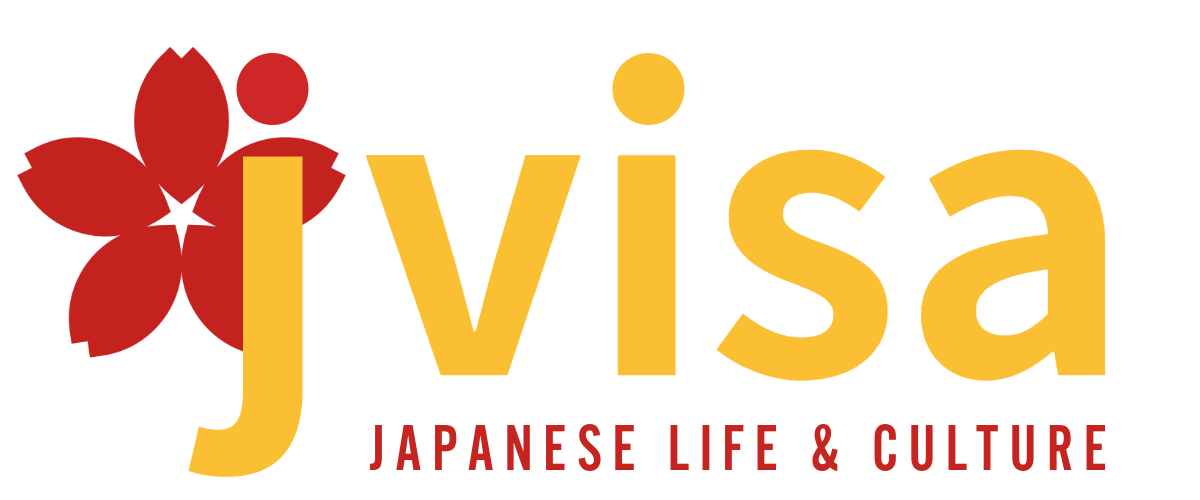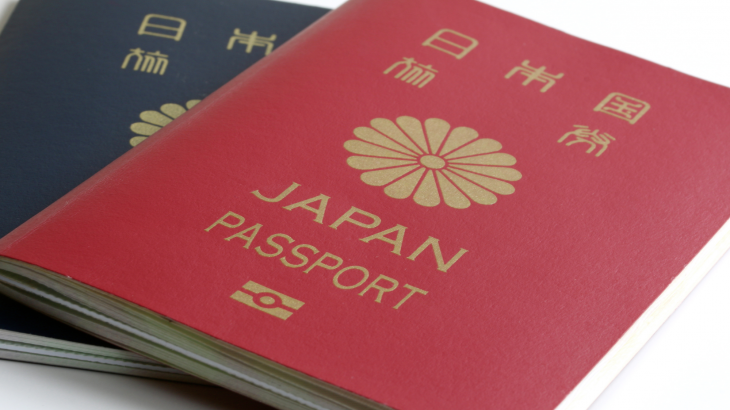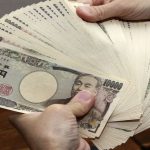In recent years, the relationship between Vietnam and Japan has been increasingly developing and becoming more solid. After over 50 years of establishing diplomatic relations, Japan and Vietnam have become strategic partners with many agreements signed to promote the economy. Additionally, the exchange of human resources between the two countries is also growing stronger. There are more and more Japanese companies establishing headquarters and factories in Vietnam, and likewise, many Vietnamese people are moving to live, study, and work in Japan.
Currently, the trend of labor export to Japan is gaining dominance and attracting a lot of attention from many people. The demand for understanding the process of labor export to Japan is increasing, but there is still some hesitation due to financial concerns. So, how much does it cost to go for labor export to Japan? Is it possible to go to Japan with limited financial conditions? Let’s find out in this article!
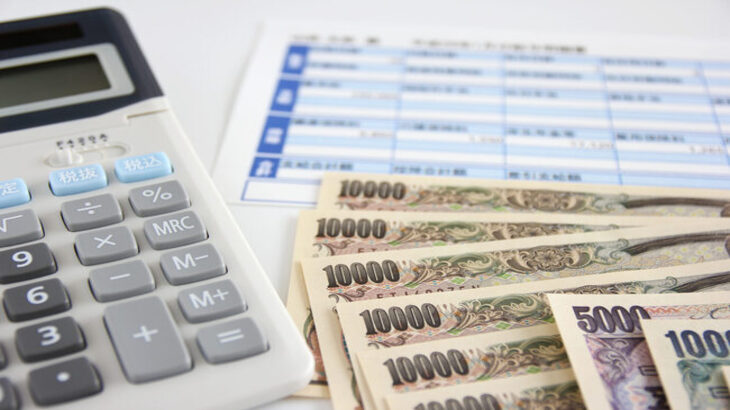
The cost of internship to Japan
The cost of going for labor export to Japan includes various expenses that must be paid to one or more sending companies, labor support personnel, intermediaries, and connections between the labor exporter and the Japanese host company. Sending companies are also responsible for training, guiding through procedures, ensuring that workers can go to Japan to work, and receiving employment immediately upon arrival in Japan.
The cost of going for labor export to Japan in previous years has always been a staggering figure, causing many workers to be shocked. Many people want to go to work in Japan but worry that they don’t have the financial means to do so, leading to taking on excessive debt and pressure in repaying it.
There was a situation where the costs escalated to over $8,300, causing a lot of difficulties for workers going for labor export to Japan at that time. To reduce the rate of absconding, many sending companies required workers to pay an additional fee for anti-absconding measures.
In 2018, understanding the difficulties faced by workers, the Ministry of Labor, Invalids and Social Affairs officially tightened regulations, issuing licenses to companies allowed to send workers for labor export. The ministry demanded action against companies that inflated prices, lacked transparency, lacked credibility, and required that the fee for labor export to Japan be listed at only $3,600 (~86 million VND).
In addition, starting from 2020, the practice of including absconding deposits in the cost of going to Japan has also been abolished. By 2022, sending companies have also begun to implement policies to support travel fees and assist in paying off fees for workers facing financial difficulties.
What is the total cost of exporting labor to Japan?
The cost of going to work in Japan as regulated by the Ministry of Labor, Invalids and Social Affairs is $3,600 (approximately 86 million VND). Additionally, there may be other types of expenses depending on each labor export company, such as:
- The cost of textbooks, uniforms and exit fees.
- Backpacks, suitcases, visas, and stamps.
- Dormitory fees and training fees.
In addition, interns participating in labor export to Japan also have additional expenses to cover personally, such as the cost of buying personal items and meals during the waiting period before departure. These expenses typically amount to around 20 – 30 million VND.
Therefore, to go for labor export to Japan, an intern will have to pay around 85 – 160 million VND. The reason for this difference is that each job order will have its own support and policies.
Details of the total costs for an internship in Japan
Japanese language tuition fee
For students who have successfully passed the job placement:
If you have participated in the recruitment process and passed the job placement, the cost of Japanese language training will be included in the total fee for going for labor export to Japan, as initially informed by the recruiter. There will be no additional expenses incurred beyond this.
You will be trained in Japanese language according to the required proficiency level of the job placement. For regular placements, the training duration is typically 6 months. However, for nursing and caregiving placements, the training duration will be 10 months.
Students participating in resource classes:
If you want to learn Japanese in advance for future labor export to Japan, the cost will vary depending on the form of learning you choose:
- For self-study, you only need to spend a very low amount of money, such as purchasing books or registering for a course through an application, which will not exceed 1 million VND.
- For studying at a Japanese language center: You will incur a relatively high cost, plus transportation costs depending on each center and the level you want to study. Tuition fees will range from 3 to 10 million VND or higher.
Health check-up fee
Not only in Japan, but when you go to work in any country, you must meet health requirements. This is the first but also extremely important step. Currently, according to regulations, candidates participating in the program to work in Japan must meet health criteria such as not having diseases that the Japanese government does not allow entry, such as hepatitis B, HIV, color blindness and other infectious diseases.
When participating in the internship program to work in Japan, you will undergo health check-ups three times with the following reference costs (health check-up fees for working in Japan are paid directly to the hospital when you come for the examination):
| Initial health check-up | ~ 1.100.000 VNĐ |
| Health check-up after being selected | ~ 750.000 VNĐ |
| Pre-departure health check-up | ~ 1.000.000 VNĐ |
Service fee for labor export
The service fee for labor export is the revenue of the enterprise used for purposes such as market research, market development, negotiation, signing of labor supply contracts, and management of workers during their employment abroad. In other words, this is the expense that the worker has to pay to the labor export company or enterprise to fulfill the employment contract abroad.
According to the Law No. 69/2020/QH14 starting from January 2022, the service fee for participating in the 3-year Internship program is reduced to an amount equivalent to 3 months’ salary according to the contract, minus the partial support fee from the recruiting enterprise for 36 months.
Training fee
- As part of the government’s policy to enhance the quality of labor working abroad, government authorities as well as enterprises are required to organize training courses for workers before they go abroad.
- Regarding the recruiting companies in Japan, they also require workers to have a certain level of Japanese proficiency (equivalent to N5 or N4 depending on the industry and the requirements of the employer) to be able to communicate and perform their duties.
In addition to these training courses, candidates are also eligible to participate in two free training courses, including:
- A mandatory 74-hour training course as required by the Ministry of Labor, Invalids and Social Affairs.
- A mandatory 164-hour training course as required by the entrusted association.

Other fees
- Visa issuance fee collected by the Consulate & Employment Support Fund: approximately 850,000 VND.
- During the study period, you will have freedom of movement and independence without restrictions. Therefore, depending on individual needs and conditions, the costs for food, transportation, and accommodation may vary, approximately ranging from 2,500,000 to 3,000,000 VND for meals and daily expenses, and 600,000 to 800,000 VND for accommodation, dormitories. This amount is not fixed but depends on the spending habits of each individual. These are “mandatory” fees that you need to prepare for when studying or participating in any work.
Impacted factors to the cost of intern in Japan
The differences in the total cost of going for an internship in Japan usually stem from three main factors: the industry of the job placement, the duration of the export and the services provided by the intermediary. Let’s delve into the details to understand the impact of these three factors:
The industry of the job placement
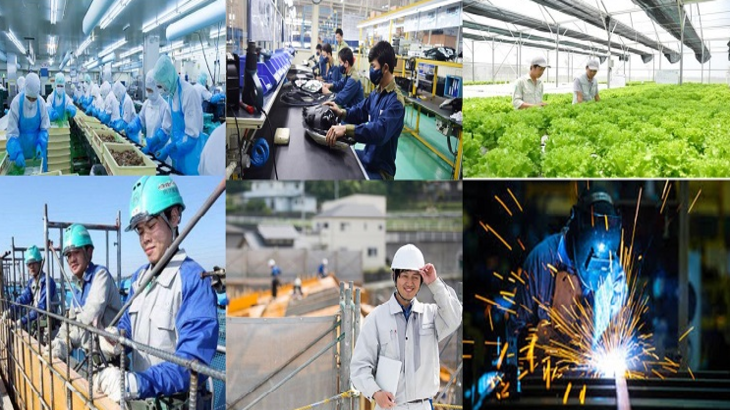
The difference in costs between various job placements primarily stems from the nature of the work. Jobs that are conducted indoors typically have higher fees compared to outdoor jobs or lighter tasks that involve more sitting. This is because indoor jobs may require specialized facilities, equipment, or training, which can increase overall expenses. For example, this is most evident in industries such as:
- Jobs in construction and agriculture generally have lower costs because they primarily involve outdoor work, which typically requires more physical labor and often takes place in rural areas.
- Jobs in mechanical and electronic industries often have higher costs due to better working conditions, typically taking place in modern indoor facilities such as factories or workshops.
Here is a reference table of the common expenses for internship programs in Japan:
| Job type | Expenses | Details |
| Construction | 110 – 130 million VND | – Immigration expenses: ~86 – 95 million VND – Expenses after being admitted: ~12 – 20 million VND – Incurred expenses: 10 million VND |
| Agriculture | 115 – 135 million VND | – Immigration expenses: ~97 – 122 million VND – Expenses after being admitted: ~19 million VND – Incurred expenses: 10 million VND |
| Mechanics | 140 million VND | – Immigration expenses: ~122 million VND – Expenses after being admitted: ~14 million VND – Incurred expenses: 10 million VND |
| Fisheries | 125 – 140 million VND | – Immigration expenses: ~97 million VND – Expenses after being admitted: ~14 – 19 million VND – Incurred expenses: 10 million VND |
| Electronics | 160 million VND | – Immigration expenses: ~122-146 million VND – Expenses after being admitted: ~14 – 19 million VND – Incurred expenses: 15 million VND |
Labor export duration
The cost for a labor export contract to Japan for 1 year and 3 years will differ mainly due to additional expenses such as living expenses, accommodation costs, training fees for skills improvement, etc. Specifically, the fee for a 1-year contract and a 3-year contract is as follows:
- The cost for internship in Japan for 1 year is relatively low, ranging from 45 to 50 million Vietnamese dong.
- The cost for a 3-year internship in Japan ranges from 85 to 160 million Vietnamese dong and this fee is currently experiencing a significant decrease compared to before.
Brokerage firm
Each labor export company or intermediary brokerage firm may have different regulations regarding the fees for sending interns, which can range from 70 to 115 million Vietnamese dong. This difference typically originates from service fees required by the intermediary for the tasks involved.
Although these fees still fall within the predetermined price range regulated by the Ministry of Labor, workers should seek reputable labor export companies to optimize costs. These companies do not charge additional brokerage fees and provide subsidy policies to help save additional expenses.
Other considerations
As usual, you cannot handle the paperwork for overseas employment procedures by yourself, so you need to seek assistance from labor export companies. However, there are many companies that take advantage of the trust of interns to increase costs for personal gain. Therefore, when choosing a labor export company, you need to pay special attention to avoid being charged high fees. Below are the regulations regarding service fees for going to work in Japan that you need to understand clearly to avoid being deceived or having prices inflated:
Prohibit any behavior of collecting money in advance
This is the content in the draft guidelines for participating in the labor supply of labor service enterprises sending workers to work abroad and the conditions for sending workers to work in certain markets, including Japan, which is currently being solicited for feedback by the Ministry of Labor, Invalids and Social Affairs (MOLISA).
The dispatch and acceptance contracts for skilled interns with the receiving enterprises must meet the following minimum conditions:
– Working hours not exceeding 8 hours per day and 40 hours per week.
– Training and technical internship allowance during the training period: minimum of 30,000 yen per month (for cases where meals are provided free of charge) and minimum of 50,000 yen per month (for cases where meals are not provided free of charge).
Enterprises are only allowed to collect fees as regulated after the interns have been granted residence status by Japan and the enterprise has signed a contract to send interns to intern in Japan. The Ministry of Labor, Invalids and Social Affairs strictly prohibits any form of advance fee collection for interns.
The service contract fees
The service contract for sending interns to Japan must ensure compliance with the following cost regulations: Service fees as regulated, not exceeding 3,600 USD per person for a 3-year contract and not exceeding 1,200 USD per person for a 1-year contract. Workers themselves bear the costs related to passports, visas and judicial records (if required).
Accommodation conditions
The deduction for accommodation costs (not applicable during training periods) from the interns’ monthly salaries should be based on actual expenses but not exceeding 20,000 yen per person per month. For major cities like Tokyo, Osaka, Kyoto and Nagoya, the deduction should not exceed 30,000 yen per person per month.
Regarding transportation expenses: The host organization in Japan shall cover the airfare to Japan and return to Vietnam for interns after completing the contract.
Additionally, the sending enterprise is responsible for negotiating with the receiving organizations to purchase comprehensive insurance for foreign interns throughout their internship period in Japan. The draft also specifies that the receiving organization shall reimburse the sending enterprise for training expenses in Vietnam, with a minimum amount of 15,000 yen per person.
Deposit money
Enterprises are only permitted to deposit money for interns if Japanese law allows, absolutely not collecting fees contrary to Japanese law related to the Skill Internship Program.
Workers must undergo training before departure
The sending enterprise must organize Japanese language training with a minimum duration of 520 sessions, provide necessary knowledge for interns as regulated and issue certificates to interns before departure. Documents related to pre-departure training for workers must be fully retained in the interns’ records at the enterprise until the interns return home and the contract is settled.
Summary
For interns who are preparing for procedures to work in Japan, cost is a very important factor. To avoid confusion and unnecessary risks from the sending company, you need to carefully research general costs and related expenses. Hopefully, this article will contribute to providing information about costs for you, allowing you to optimize expenses most effectively!
